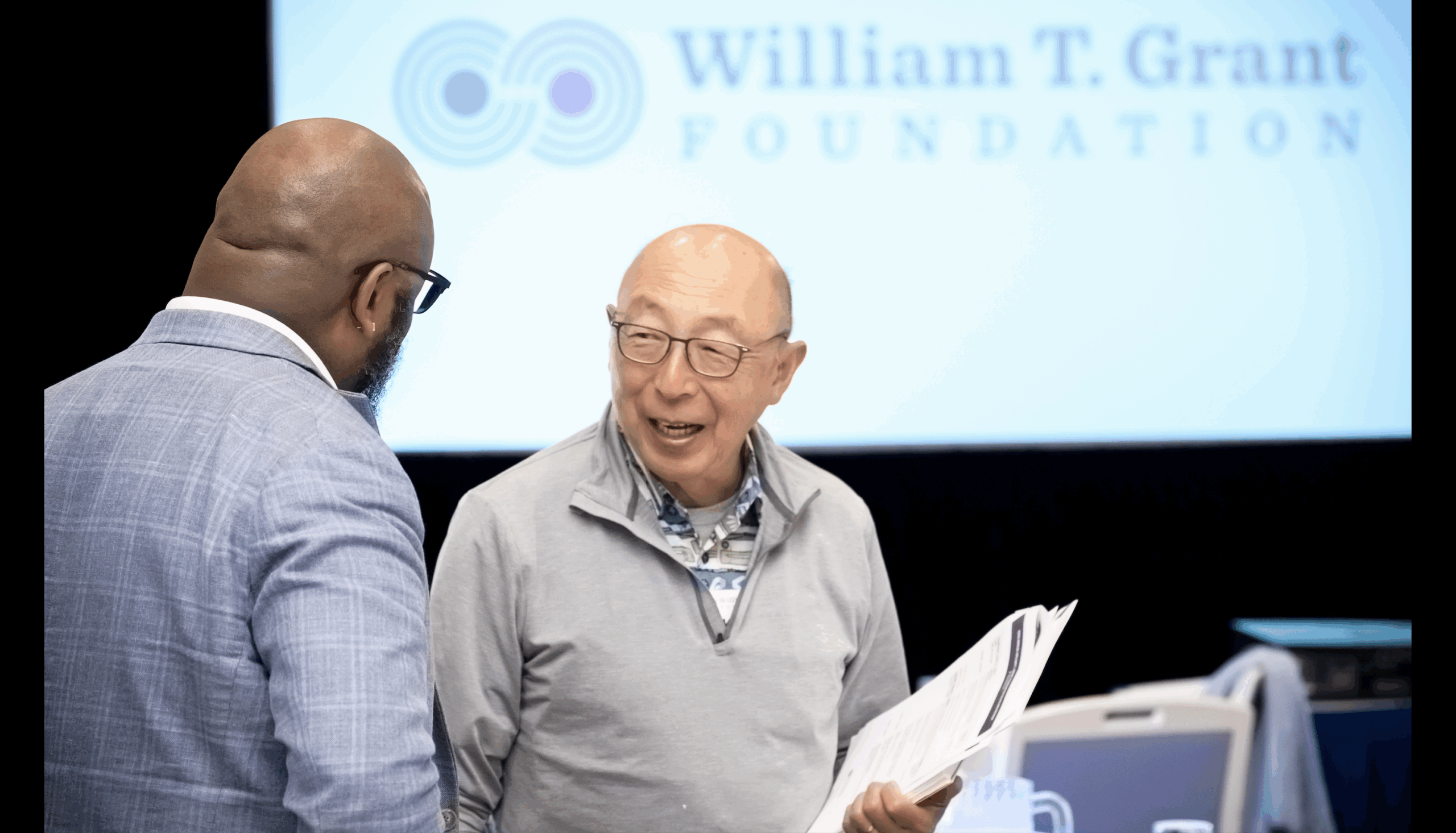Since 2005, the Foundation has awarded grants to William T. Grant Scholars and, since 2018, to research grantees to support their development as mentors to junior researchers of color. The program harbors two equally important goals: In addition to strengthening the mentoring received by junior researchers of color, the program also aims to develop grantees’ understanding of the career development issues facing their junior colleagues of color and bolster their mentoring relationships with them.
While mentors applying to the program pay close attention to how they plan to support their mentees’ career development, they sometimes don’t emphasize their own goals as a mentor. We hope to encourage applicants to think about mentoring as an opportunity for growth on both sides of the relationship, not just for mentees.
We sat down with Bernadette Sanchez, Professor of Educational Psychology at the University of Illinois, Chicago and a recent mentoring grantee, to learn more about her approach to growth as a mentor. Alongside her mentee So Jung Lee, a Korean doctoral student at the University of Illinois, Chicago, Sanchez sought to develop strategies to better support Asian and Asian American scholars and promote a culture of collective responsibility for mentoring graduate students of color within her department and college. The mentoring grants program “has really reinforced the idea that I’m also a learner as a mentor,” she said.
How do you approach thinking about growth as a mentor?
Even though I’ve been mentoring for many years and I’m a senior researcher, over time, I always face new challenges in my mentoring relationships with junior scholars. What I think works with one person may not work with another person, or what has been successful with a group of people is not successful with a new student. I’m also facing new challenges as a mentor as my career changes. For example, as I get further in my career, I have more responsibilities. Maybe I’m in leadership roles or service roles in my department or college or field. I might be managing more projects and more people, so some of the things that I like to do—like my one-on-one times with mentoring students—I find that my time is more limited for that.
What I’m trying to say is that I look at the areas where I feel like I’m being challenged and where I need to learn. That kind of perspective—that I’m constantly learning—was really helpful for me as I was approaching the application.
How did you identify areas of growth as a mentor?
As I work with students, I take time to reflect with them on what’s working well and what could be improved. The application helped us do that. As we were preparing the application, I worked with So Jung to try to figure out what areas she felt like she needed support in our mentoring relationship. That also helped me in improving my role as a mentor in meeting [her] needs.
Even though there is that power differential, [students] are able to say what they need without necessarily saying to me, “You need to do a better job on this.” They might say, “I need more time on X,” or “I would love it when you give me feedback, if you can say XYZ.” That’s their way of telling me what it is that I need to do or how to improve what I’m doing. Conversations with the applicant are very helpful, but then also talking with other students that I’ve worked with and asking them, “What are ways that I could have improved?” Especially with more advanced people [that] I’ve been working with longer and have a more trusted relationship [with], they might be more comfortable giving me that feedback.
What activities did you undertake to grow as a mentor? How did you identify those activities?
An area where I felt like I needed to learn more was how to better support my specific scholar. She’s an international Asian scholar. I realized, in looking back at who I’ve mentored in the past, most of the people I’ve mentored were either Latino or African American. I had less experience with mentoring Asian or Asian American scholars. I did take time to engage in my own growth and [seek out] activities to learn more about [Asian and Asian American students’] needs and what was happening at the time. Since the pandemic, [there’s been] increased hate crimes towards Asian and Asian American people in the U.S., increased mental health symptoms that young Asian and Asian American people were experiencing because of this increase in hate crimes and discrimination. So [I was] developing my own sensitivity to these kinds of things that So Jung and other Asian and Asian American scholars might be experiencing.
One of my other goals was to increase the collective responsibility in my institution around mentoring underrepresented scholars. I utilized what I was learning through this grant, but then I also utilized the reports that the William T. Grant Foundation has around mentoring, where they have some guidebooks on how to mentor underrepresented scholars. I shared those resources, for example, with my department, and presented some of the main ideas and co-facilitated a discussion with some of my colleagues around that. I joined committees that were related to mentoring in my department and college to improve the experiences of our early career scholars, our graduate students in our department, and create a sense of belonging. I deliberately chose service activities that would support the mentoring of grad students.
Finally, I was asked to join a mentoring task force at the university. This first year is to do an inventory of all the mentoring that’s taking place across early career scholars. What are their experiences and what are their needs? This is a really good way to for me to use what I’ve learned to support this task force, but also a good way for me to learn what is happening on campus and try to use what we learned from that task force to improve the mentoring in my department and my college.
What has your trajectory as a mentor looked like? How has your mentoring philosophy developed over time?
This experience has really reinforced the idea that I’m also a learner as a mentor. I love the William T. Grant retreats. I found those very helpful because I’ve learned from my colleagues. I was able to pick their brains on how they do certain things in their research teams when they mentor early career scholars. [I try] to take advantage of those kinds of opportunities to help me overcome the challenges that I experienced as a mentor. In general, it forces me to reflect on what I could do to improve, and then to actively look for supports and resources to help me do that.
The grant [also] forced me to not be so selfish and think beyond my little mentoring group, to think about my department and my college and the institution. How can I utilize what I learned to support to improve the institutional norms and infrastructure to better to provide better mentoring experiences for early career scholars at our institution overall? It made me think beyond my group: the colleagues that I have, other faculty, whether they’re assistant professors, or associate professors thinking about going up to full. How can I support them? How can we change some of the policies and structures in our department, college, university to better support underrepresented scholars?
Any advice for how mentors can approach their own development?
Schedule check-in meetings with your mentee and not only focus those meetings on the mentee’s activities and their professional development, but also take time to reflect on how things are going in the relationship. Ask questions [that] open the door to allow the mentee to give feedback: How are things going with us? Are you okay with the frequency of meetings? Is there anything else you need? Is there something missing in the support that I’m giving you? It’s a good way to reflect, as a pair, on how the mentor relationship is going.
View yourself as a learner as well. There might be some principles that are helpful across all mentees, but look at each mentee as a person and try to figure out what it is that they need so that you can tailor your style toward the mentee’s needs. I’m saying all that because there’s still something to learn as a mentor, and things that might have worked for many years, you may realize, [are] not necessarily working as well. [You might say,] “I need to step back and look at what I’ve been doing. How can I do things differently to make it better?” Taking a learner perspective, I think, is helpful.






